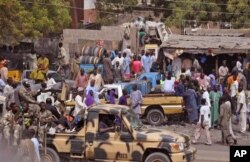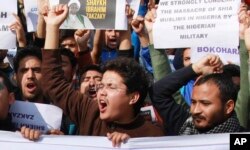The Nigerian Human Rights Commission has accused the military of using disproportionate force in Zaria, in the country's north, where at least 380 Shiite Muslims were killed in 2015.
In a report released Thursday in the capital, Abuja, the human rights organization said the victims were members of the Islamic Movement of Nigeria sect, led by Sheik Ibrahim El-Zakzaky, who is now in prison.
The country's director of defense information, Brigadier General Rabe Abubakar, told VOA he expects the charges to be deemed false. The accusations, he said, are unfair and regrettable.
"It's unfortunate that they could come up with this kind of [accusation]. ... The last time they made similar allegations against the Nigerian armed forces, eventually turned to be false,” he said.
Nigeria's armed forces are responsible for ensuring "peaceful coexistence" and national stability, Abubakar said in an interview, and also ensuring that their actions are "enshrined" in the constitution.
"Whatever we do is for the best interest of this country," the general said.
"We are constitutionally empowered to ensure total peace and security in our country,” he added, “and whatever actions that may have been exhibited by the force, I believe, is something which should be commended, not condemned.”
"We don't have any issue with the human-rights group here in Nigeria," he said, but claimed that the commission has never condemned the Boko Haram group's repeated killing of innocent civilians.
"The small action we take for self-defense and to protect the people," the defense official said, has been "exaggerated" by the rights commission.
Past disputes
The criticism of the armed forces’ action against Islamic sect members traces back to an incident last December, when soldiers accompanying the army's chief of staff, Lieutenant General Tukur Yusuf Buratai, broke up a procession that had blocked a major road and prevented the senior army official's passage.
The army disputes the commission's account that the confrontation left about 380 sect members dead.
A judicial commission appointed by the Kaduna state government has released a list of names of those killed in December, and some civil society groups have demanded an independent investigation of the incident.
Human rights groups have previously accused the military of flagrant violation of citizens' rights during its continuing fight against armed groups, including the Islamist militants of Boko Haram. They contend the military flouts internationally accepted rules of engagement in the fight against terrorism, and they have called for the prosecution of soldiers involved in illegal killings and other rights violations.
Military ‘applauded’
Abubakar denies all such accusations and says the Nigerian military has shown it is able to respect the rights of citizens — to such an extent that Nigeria has been invited to participate in numerous international peacekeeping missions. He also noted the Nigerian military has an office of human rights that trains soldiers to respect the rights of citizens.
"We have cooperated with independent organizations that come to this country to assist us in moving forward," Abubakar said. "No organization that is based here has negative opinions about the military."
He complained that the government human rights commission "doesn't see anything good in the Nigerian armed forces even when we are applauded outside the country."
Abubajar added: "I hope that the Nigerian citizens, for whom we are doing all this, appreciate what we are doing and are seeing what we are doing positively in order to get rid of any form of criminality and extremism in our country."
‘Minor incidents’ occur
The defense official said the army has "rules of engagement and operational procedures, and these are our guidelines in the conduct of our operations at all levels."
As for the alleged killing of hundreds of members of the Islamic Movement of Nigeria, Abubakar said: "We cannot 100 percent rule out the possibility of minor incidents, but ... we are always try to rid our nation of any form of hooliganism, militancy and terrorism. And I believe the world at large appreciates what we are doing to keep the world free of terrorism.
"The Nigerian armed forces of yesterday are not the Nigerian armed forces of today," he continued. "We are refining, we are reforming and we have taken steps in line with the current administration's policy of protecting human rights at all levels of our operations.
"We have internal mechanisms to check human-rights violations," Abubakar told VOA. "Right now we have some officers who are facing trial on charges of human-rights abuse. This shows that the armed forces of Nigeria are very mindful and ready to protect the people and their assets according to very decent and very acceptable and globally recognized rules of engagement."






